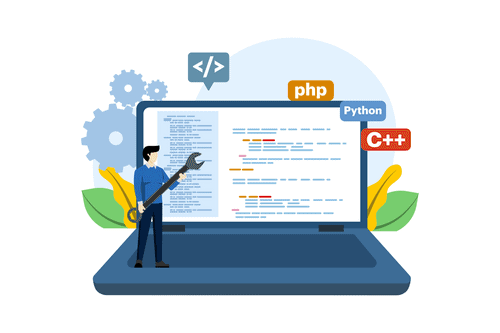

Creating a successful WordPress plugin goes beyond just coding—it requires appropriate tools to simplify development and guarantee your plugin operates without issues. Whether you’re new to plugin creation or an experienced coder, a robust set of tools in your arsenal can make a big difference. The right tools not only speed up the process but also help you steer clear of common traps like messy code sluggish performance, or security holes.
WordPress plugin development needs a mix of creative problem-solving and technical expertise. But with so many options, which ones should you zero in on? In this post, we’ll take a look at the top 11 essential tools every WordPress plugin developer should have in their toolkit.
What Are WordPress Plugin Development Tools and Their Benefits?
Let’s start by understanding these WordPress development tools and the significance of selecting appropriate development tools. WordPress developer tools cover a broad spectrum of resources that aim to assist developers in creating, testing, and maintaining WordPress plugins. These tools offer benefits such as clean and organized code, simplified collaboration, faster development, and enhanced customization options. Here’s a brief look at how they can revolutionize your development process:
- Ensures structured, easy-to-read code, reducing bugs and making plugin maintenance easier.
- Simplifies team collaboration through version control and collaboration tools.
- Speeds up the development process with pre-built libraries, and templates.
- Enables high levels of customization that allow for the creation of tailored solutions.
- Enhances website performance through performance optimization tools.
Top 11 WordPress Plugin Development Tools
Let’s dive into the 11 must-have tools that every WordPress plugin developer should consider using. These WordPress developer tools streamline the development process, help in testing and debugging, provide a staging environment, and many features that will help you develop a useful plugin.
WordPress Plugin Development Tools
Here are some essential WordPress plugin development tools that simplify and enhance the WordPress plugin creation process. These tools streamline coding, automate tasks, and help developers maintain high standards while improving efficiency throughout the project lifecycle.

GenerateWP
GenerateWP is a WordPress plugin generator created to make it easier to write custom code for WordPress projects. Whether you’re building a small plugin or working on a big plugin, this tool makes development less complicated and more productive allowing you to concentrate on creating great features. GenerateWP improves WordPress workflow by providing various tools and generators. The platform also provides tools like custom post type generator, shortcode generator, taxonomy generator, and meta box generator, ensuring compatibility with the latest WordPress coding standards and APIs.
Pros of GenerateWP
- Generates valid WordPress code in seconds, reducing development time.
- Offers tools for everything from post types to taxonomies, keeping your projects flexible.
- Access and manage your code from anywhere, making it easy to collaborate or work remotely.
- Ensures that the code generated fits seamlessly into your WordPress setup, minimizing potential issues.
Cons of GenerateWP
- The free version has restricted access to certain advanced generators.
- While perfect for simple projects, more complex needs may require additional manual coding beyond what GenerateWP provides.
Pricing: You can get GenerateWP for free. The pro version starts at $49/year.
The WordPress Plugin Boilerplate
The WordPress Plugin Boilerplate is an immensely useful tool for developers. It provides a structured well-organized, and object-oriented base to build top-notch WordPress plugins. It follows WordPress coding rules making the development process easier and ensures plugins work well with the platform. The boilerplate’s compliance with coding standards promotes excellent performance across various environments.
Pros of WordPress Plugin Boilerplate
- Significantly reduces setup time by providing a ready-to-use structure.
- An organized structure makes it easy to manage and update plugins over time.
- Helps developers adhere to WordPress coding standards and object-oriented principles, which results in higher-quality plugins.
- Backed by a strong developer community that provides updates and improvements.
Cons of WordPress Plugin Boilerplate
- Developers who aren’t used to coding with object-oriented programming may find the boilerplate more challenging than useful.
- In cases of simple or small plugins, the boilerplate is likely to introduce many complexities.
If you find implementing the boilerplate challenging, consider availing of WordPress plugin development services. These services can help streamline your development process, ensuring you leverage the full potential of the boilerplate without the learning curve.
Pricing: The WordPress Plugin Boilerplate is available for free.
WP-CLI
WP-CLI is a command-line interface and completely alters how developers interact with WordPress. If you are managing lots of installations, automating repetitive tasks, or debugging plugins, regardless of what you need to do, WP-CLI allows you to carry out hundreds of actions directly from the terminal without using a web browser.
WP-CLI is all about commands that will allow you to manage your WordPress site in various functions. For example, installing and activating plugins can be accomplished with a single command:
$ wp plugin install user-switching –activate
With WP-CLI, you can streamline your development workflow, automate tasks, and enhance productivity with ease.
Pros:
- Streamlines common tasks, reducing time and effort.
- Facilitates script creation for automated testing and deployment.
- Run WordPress functions from the command line instead of the dashboard.
Cons:
- Effectiveness can vary based on the server or development setup, requiring potential customization.
- A learning curve may exist for those unfamiliar with command-line tools.
Pricing: WP-CLI is Free.
WordPress Debugging Tools

Now let’s look at some essential debugging and testing tools that every WordPress plugin developer should use. These tools help identify issues, optimize performance, and ensure code quality, making development more efficient and reliable.
Xdebug
Xdebug is a valuable tool for WordPress plugin developers. It simplifies debugging, enhances error reporting, and aids in analyzing PHP application performance. Xdebug supports step debugging, error tracking, and code coverage analysis. This helps developers write better and more efficient code. If you’re looking to streamline your debugging and improve performance analysis, Xdebug is a must-have tool.
Pros:
- Xdebug is free and regularly updated by active developers.
- Provides precise, step-by-step debugging.
- Compatible with most modern IDEs.
- Enhances error tracking for detailed error paths.
- Profiling and tracing tools identify performance bottlenecks in PHP applications
Cons:
- Complex setup for beginners, especially with IDEs.
- Slows performance in large PHP applications.
- Introduces significant overhead, not recommended for production environments.
Pricing: Xdebug is an open-source extension and is completely free to use for all developers.
Query Monitor
Query Monitor is a robust developer tool for WordPress that provides a comprehensive overview of various performance aspects of your site. This encompasses PHP errors, database queries, hooks, and actions. It also includes block editor blocks and HTTP API calls. It’s especially helpful for identifying performance problems, troubleshooting intricate database queries, and comprehending the interactions among WordPress core, themes, and plugins.
Pros:
- Pinpoint issues with plugin code, conflicts, and performance bottlenecks.
- Real-time insights help developers iterate more quickly and safely.
- It offers nearly complete visibility into WordPress execution and is useful for optimizing both plugins and themes.
Cons:
- Running Query Monitor on a live site can introduce some additional resource usage.
Pricing: Free access to basic debugging features. Pro: $49/year.
Looking to hire a WordPress plugin development company for your business?
Check out our WordPress Plugin Development ServicesChrome Developer Tools
Chrome Developer Tools (DevTools) are essential tools integrated directly into the Chrome browser. It allows you to inspect and debug your web pages accurately. DevTools allows you to quickly identify and resolve design, layout, and performance issues by examining various aspects of your site.
Key features include comprehensive inspection, dynamic editing, performance analysis, and JavaScript debugging. These tools provide instant feedback on changes, help track resource loading times, and identify bottlenecks.
Pros:
- Integrated directly into Chrome, removing the need for extra software.
- See how changes affect your page instantly, speeding up development.
- Covers a broad range of needs for front-end development, from element inspection to performance profiling.
Cons:
- The extensive features can be overwhelming for newcomers and require time to master.
- While powerful in Chrome, compatibility with other browsers may necessitate additional tools or testing.
Pricing: Chrome DevTools are available at no cost, offering a comprehensive suite of debugging and development tools built into the Chrome browser.
PHP_CodeSniffer
PHP_CodeSniffer helps developers enforce coding standards across PHP. But it is not limited to just PHP, it also works well with JavaScript and CSS files. Incorporating WordPress Coding Standards (WPCS) improves the quality, consistency, and readability of your code. The tool automates compliance, supports multiple languages, allows rule customization, and integrates with development environments.
If you’re seeking custom configurations for PHP_CodeSniffer to meet specific needs or integrate it into complex projects, consider reaching out to a WordPress plugin development company. Their expertise can ensure that your code not only meets industry standards but also aligns perfectly with your project requirements.
Pros:
- Encourages clean, well-documented code.
- Ensures reliable, maintainable plugins.
- Automatically detects coding standards violations.
- Maintains consistency across the WordPress ecosystem.
Cons:
- Setting up PHP_CodeSniffer with WordPress Coding Standards can be challenging for those new to command-line tools or coding standards.
- Automated checks may flag best practice codes that don’t strictly conform to standards, potentially causing unnecessary changes or requiring manual review.
Pricing: PHP_CodeSniffer is available at no cost, offering a robust solution for ensuring code quality and consistency in your development projects.
WordPress Staging Tools

For staging and optimization, these tools help developers manage site environments and improve performance. These tools simplify the testing process and ensure that your WordPress sites run efficiently before going live.
InstaWP
InstaWP is a game-changing tool for WordPress developers, providing a streamlined solution for creating and managing staging environments with just a few clicks. Whether you’re testing plugins, themes, or entire site configurations, InstaWP makes the process fast and straightforward. TPlugins and themes can be tested straight from the plugin page with the help of the InstaWP Launcher plugin. Template creation saves time by creating specific templates for sites.
Pros:
- Instantly launches sites for rapid development and testing.
- Simplifies site management with a single dashboard.
- Reduces the need for separate server setups.
Cons:
- While excellent for staging and testing, InstaWP lacks some advanced features found in more comprehensive development tools.
Pricing: Free: Basic features and unlimited access. Pro Version: $10/month for additional features such as custom domains and advanced management tools.
WP Rocket
WP Rocket is a premium caching plugin. It’s known for its powerful and efficient caching system. It’s easy to use, even for beginners. Automatic optimization features help speed up websites. Key features include automatic caching, multiple advanced optimizations based on webpages, WooCommerce compatibility, static HTML file creation, browser caching, lazy-loading photos, XML sitemap preloading, Google Fonts optimization, support for common themes (like Avada), and built-in documentation.
Pros:
- Streamlined setup and easy-to-use interface.
- Includes advanced features like removing unused CSS and delaying JavaScript execution to improve Core Web Vitals.
- Easily integrates with widely used plugins and hosting platforms.
- Access to dedicated support and extensive documentation.
Cons:
- WP Rocket is exclusively a premium plugin, meaning there is no free version available.
- The improvements on WordPress.com might be less significant due to the platform’s built-in optimizations.
Pricing: WP Rocket offers three pricing tiers: Single ($49), Plus ($99), and Infinite ($249), each with a year of support. It offers a 14-day money-back guarantee.
CSS Preprocessing & Build Automation Tools
CSS preprocessors and build automation tools are especially helpful when you are trying to keep the development process flowing while having a more rapid development workflow. These tools increase the efficiency of your workflow by automating things like code compilation, and optimizations, or by refreshing the code with new changes to the CSS once the file has been saved.

Image credits: Freepik
CodeKit
One of the CSS preprocessor tools is CodeKit, which will improve the quality and process of your WordPress development workflow and quickly automate CSS preprocessing, and compile. CodeKit supports Sass, LESS, and Stylus which is perfect when developing plugins and want to stay focused on their styling. CodeKit supports instant browser refresh, layout enhancements, built-in optimization tools, and flexibility in using or integrating into WordPress workflows. CodeKit can help boost productivity and decrease manual coding to save developers time.
Pros:
- Automated Code Compilation and Optimization
- Allows developers to focus on clean code writing.
- Provides instant browser refreshing.
- Offers tools for CSS preprocessing, JavaScript error checking, and image optimization.
Cons:
- New users may face a learning curve when getting accustomed to its features and setup, especially if they are new to CSS preprocessing tools.
- While it integrates well with WordPress, developers must ensure compatibility with different browsers and environments.
Pricing: Single License: $29.99.
Prepros
Prepros is a handy tool that helps with CSS preprocessing and build automation. It works with different languages and has features to make things better. You can use it on Windows, Mac, and Linux, and it has a good mix of what it can do. This tool makes your files smaller, puts them together, and makes images look good while taking up less space. This means your website loads faster and runs more. If you’re a developer who wants an easy way to handle CSS preprocessing and make builds happen on their own, Prepros is a great choice.
Pros:
- Intuitive design for all skill levels.
- Minimal impact on system resources.
- Balances preprocessing, build automation and optimization.
Cons:
- For highly complex automation tasks, Prepros may not match the capabilities of tools like Gulp, which are designed for more intricate workflows.
Pricing: Single-User License: $29.
Conclusion
To sum up, utilizing appropriate WordPress plugin development tools such as GenerateWP and the WordPress plugin boilerplate can have a positive impact on your plugin creation process. These tools simplify development and assist in ensuring your code is efficient and well-structured. When you’re constructing a custom post type or developing complex features, these resources play an essential part in producing high-quality plugins.
Are you prepared to elevate your plugins? Start using these tools now to enhance productivity and deliver top-notch customized solutions. Use the best WordPress plugin development tools available to get the most out of your development!





